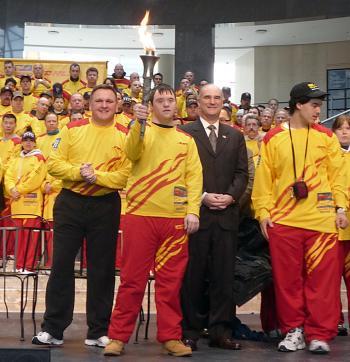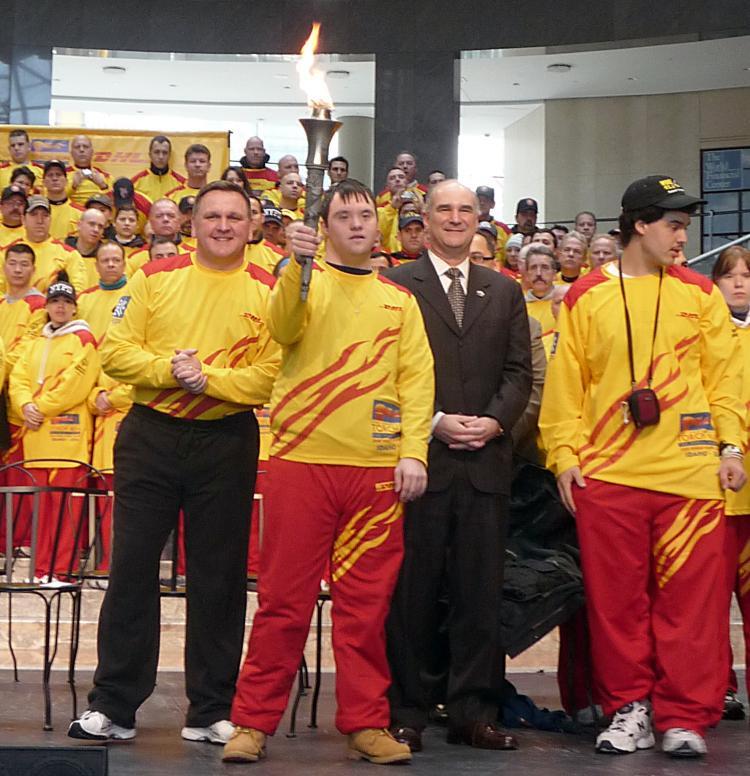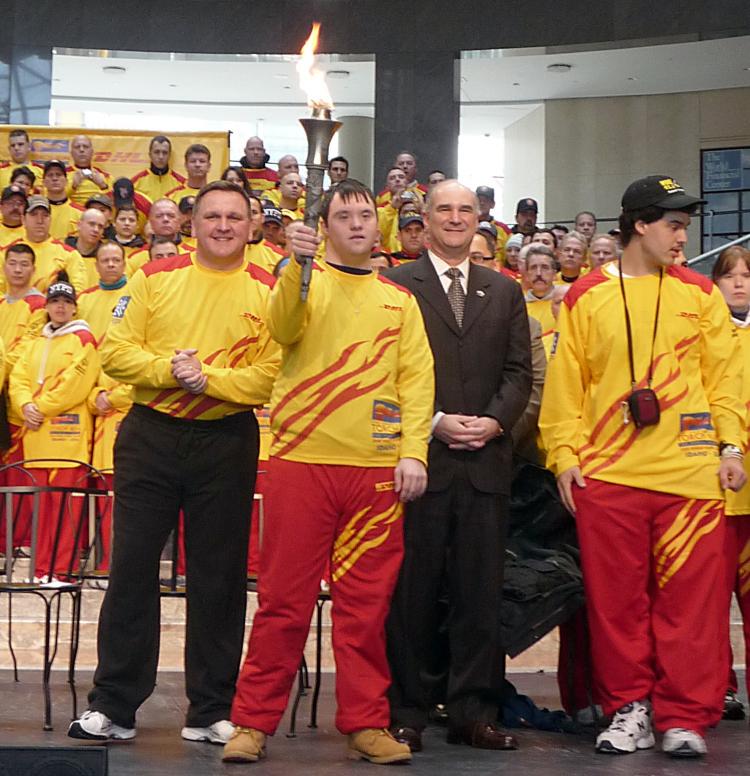NEW YORK—In less than one week, law enforcement officials and Special Olympics athletes will carry the Special Olympics torch down the streets of Washington, D.C. following Barack Obama’s inauguration. The Washington, D.C. stop will be one of three U.S. cities to welcome the torch this year preceding the Winter Games in Boise, Idaho.
For the New York leg of the trip, ten New York-based athletes from Team USA and hundreds of law enforcement professionals ran the torch down snowy streets on Thursday from City Hall to the World Financial Center.
Special Olympian Peter Dailey was one of the athletes who participated in the run. An ice skater from Rochester, Dailey said he “enjoyed” running in the snow very much. Dailey, 23, has won several gold medals since he began competing in the Special Olympics in 2001.
Throughout its journey across 10 countries, DHL courier transported the flame. Following Washington, D.C., the torch will be transported to Los Angeles. Already it has traveled 37,000 miles, with nearly 4,000 more to go.
“We deem them to be heroes because they overcome their disabilities to be able to participate in the Games,” Nigrelli said, adding that, in turn, the athletes see police as heroes for the work that they do.
Working in law enforcement naturally poises these volunteers to gravitate toward a cause like the Special Olympics, according to Nigrelli. “The Special Olympics is all about acceptance, tolerance, everything we (law enforcement) stand for.” This is the 11th year Nigrelli has volunteered for the Special Olympics.
This was during an era when intellectually challenged children were treated with a certain amount of fear and uncertainty. “People were fearful and didn’t know what to do” around special needs children, he said.
Since then, Conner and his wife have traveled to a multitude of countries to raise public awareness about mental disabilities, using the Special Olympics as a way to break barriers surrounding the issue. “Sports automatically foster interaction,” Conner said. “It might start with a game, and then they might decide they can be friends. The Special Olympics have reformed the discussion on what is possible for this community.”
For the New York leg of the trip, ten New York-based athletes from Team USA and hundreds of law enforcement professionals ran the torch down snowy streets on Thursday from City Hall to the World Financial Center.
Special Olympian Peter Dailey was one of the athletes who participated in the run. An ice skater from Rochester, Dailey said he “enjoyed” running in the snow very much. Dailey, 23, has won several gold medals since he began competing in the Special Olympics in 2001.
Throughout its journey across 10 countries, DHL courier transported the flame. Following Washington, D.C., the torch will be transported to Los Angeles. Already it has traveled 37,000 miles, with nearly 4,000 more to go.
Getting Hooked
All 400-law enforcement officials who joined the athletes on the Global Law Enforcement Torch Run are volunteers. The run is one of many events law enforcement officials do to help raise funds and awareness for the Special Olympics. Other events include Polar Plunge, in which officers take a dip in icy waters, and Law and Orders, where they serve as waiters for a day. Proceeds from the events go to the State’s committee.
Captain Steven Nigrelli of the New York State Police “got hooked” on the Special Olympics when he attended the games for the first time 10 years ago. His job was to present medals to the winners on behalf of his police force. He was blown away by the athletes’ joy.“We deem them to be heroes because they overcome their disabilities to be able to participate in the Games,” Nigrelli said, adding that, in turn, the athletes see police as heroes for the work that they do.
Working in law enforcement naturally poises these volunteers to gravitate toward a cause like the Special Olympics, according to Nigrelli. “The Special Olympics is all about acceptance, tolerance, everything we (law enforcement) stand for.” This is the 11th year Nigrelli has volunteered for the Special Olympics.
Thirty Years of Dedication
Gold medalist Bart Conner and his wife Nadia Comaneci, both gymnasts, have donated the services of their gymnastic studio to training special Olympians. Comaneci now serves as the vice chair on the Special Olympics’ International Board of Directors.
It all started when Conner was 20 years old. He was invited to teach a couple of kids gymnastics. “I really got hooked on the amount of pleasure they got,” he said. “I was hooked on the spirit. It was the first time he had seen their joy and lack of inhibition.This was during an era when intellectually challenged children were treated with a certain amount of fear and uncertainty. “People were fearful and didn’t know what to do” around special needs children, he said.
Since then, Conner and his wife have traveled to a multitude of countries to raise public awareness about mental disabilities, using the Special Olympics as a way to break barriers surrounding the issue. “Sports automatically foster interaction,” Conner said. “It might start with a game, and then they might decide they can be friends. The Special Olympics have reformed the discussion on what is possible for this community.”







